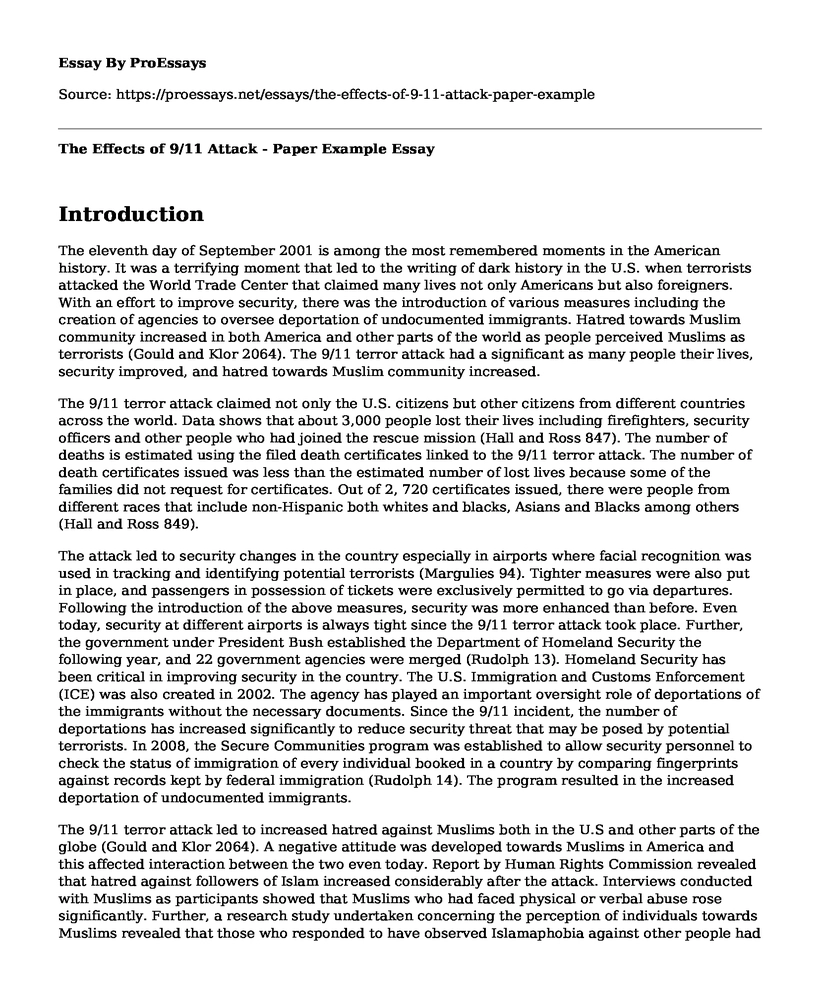Introduction
The eleventh day of September 2001 is among the most remembered moments in the American history. It was a terrifying moment that led to the writing of dark history in the U.S. when terrorists attacked the World Trade Center that claimed many lives not only Americans but also foreigners. With an effort to improve security, there was the introduction of various measures including the creation of agencies to oversee deportation of undocumented immigrants. Hatred towards Muslim community increased in both America and other parts of the world as people perceived Muslims as terrorists (Gould and Klor 2064). The 9/11 terror attack had a significant as many people their lives, security improved, and hatred towards Muslim community increased.
The 9/11 terror attack claimed not only the U.S. citizens but other citizens from different countries across the world. Data shows that about 3,000 people lost their lives including firefighters, security officers and other people who had joined the rescue mission (Hall and Ross 847). The number of deaths is estimated using the filed death certificates linked to the 9/11 terror attack. The number of death certificates issued was less than the estimated number of lost lives because some of the families did not request for certificates. Out of 2, 720 certificates issued, there were people from different races that include non-Hispanic both whites and blacks, Asians and Blacks among others (Hall and Ross 849).
The attack led to security changes in the country especially in airports where facial recognition was used in tracking and identifying potential terrorists (Margulies 94). Tighter measures were also put in place, and passengers in possession of tickets were exclusively permitted to go via departures. Following the introduction of the above measures, security was more enhanced than before. Even today, security at different airports is always tight since the 9/11 terror attack took place. Further, the government under President Bush established the Department of Homeland Security the following year, and 22 government agencies were merged (Rudolph 13). Homeland Security has been critical in improving security in the country. The U.S. Immigration and Customs Enforcement (ICE) was also created in 2002. The agency has played an important oversight role of deportations of the immigrants without the necessary documents. Since the 9/11 incident, the number of deportations has increased significantly to reduce security threat that may be posed by potential terrorists. In 2008, the Secure Communities program was established to allow security personnel to check the status of immigration of every individual booked in a country by comparing fingerprints against records kept by federal immigration (Rudolph 14). The program resulted in the increased deportation of undocumented immigrants.
The 9/11 terror attack led to increased hatred against Muslims both in the U.S and other parts of the globe (Gould and Klor 2064). A negative attitude was developed towards Muslims in America and this affected interaction between the two even today. Report by Human Rights Commission revealed that hatred against followers of Islam increased considerably after the attack. Interviews conducted with Muslims as participants showed that Muslims who had faced physical or verbal abuse rose significantly. Further, a research study undertaken concerning the perception of individuals towards Muslims revealed that those who responded to have observed Islamaphobia against other people had increased. Participants who claimed to have witnessed stereotypes against Muslims rose from 69% to 93% (Gould and Klor 2071). Islamophobia also increased significantly in other countries such as the U.K after the 9/11 terror attack.
Conclusion
It is evident that the 9/11 terror attack had both short-term and long-term effects. The attack led to many deaths and destruction of property. Security was improved, and the number of deportation of illegal immigrants has been on the rise. Even those caught with minor fractions faced deportation after the terror attack.
Works Cited
Gould, Eric D., and Esteban F. Klor. "The Longrun Effect of 9/11: Terrorism, Backlash, and the Assimilation of Muslim Immigrants in the West." The Economic Journal 126.597 (2016): 2064-2114.
Hall, Todd H., and Andrew AG Ross. "Affective politics after 9/11." International Organization 69.4 (2015): 847-879.
Margulies, Joseph. What Changed When Everything Changed: 9/11 and the Making of National Identity. , 2013.
Rudolph, Chris. "National security and immigration in the United States after 9/11." (2017).
Cite this page
The Effects of 9/11 Attack - Paper Example. (2022, Aug 03). Retrieved from https://proessays.net/essays/the-effects-of-9-11-attack-paper-example
If you are the original author of this essay and no longer wish to have it published on the ProEssays website, please click below to request its removal:
- Methamphetamine Essay Example
- Women in War Essay Example
- Reaction Paper: Black Men and Public Space
- Stereotyping, Prejudice and Attribution Theory Paper Example
- Political Impact of 9/11 Attack - Essay Sample
- Breaking the Color Line: W.E.B. DuBois and the African American Struggle for Equality
- Essay Example on Michelle Obama: A Symbol of Hope and Realistic Change







